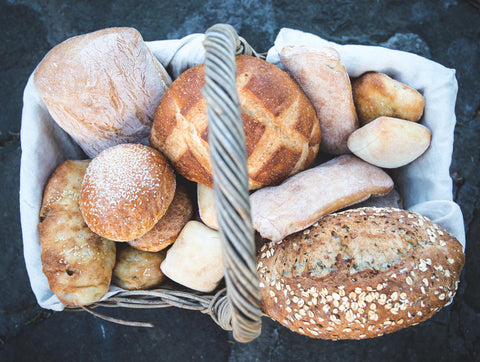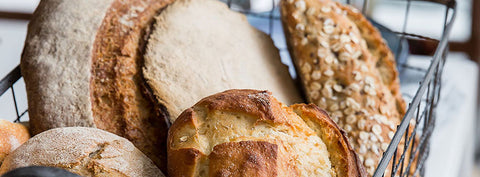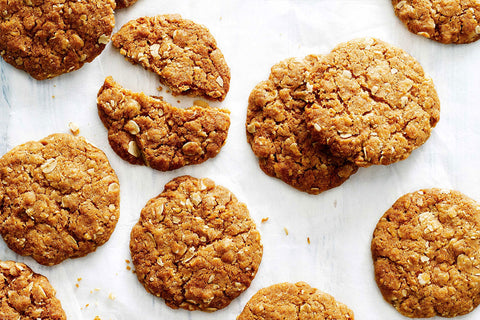Making great bread is a fine art. The word ‘artisan’ is so frequently used these days that it seems to have lost its true worth. The same can be said for the quality of breads that are more readily available.
With low carb, paleo and gluten free diets on the rise, bread has been wrongly accused of not being healthy. But bread made the traditional way, with a few simple, wholesome ingredients and no unnecessary additives can be a wonderful addition to a balanced diet.
Good bread is made from a few simple, natural ingredients including flour, water, salt and a little yeast or sourdough – add some time and a dose of love and it’s great. It’s as much about what is left out of bread as what is put in!
Many breads are made by adding ingredients to speed up the process, which is typical of mass producied lighter, less flavoursome breads. We prefer to ferment the dough slowly before it is baked.
There are two advantages to slowing the fermentation process down. Firstly, more flavour can be extracted from the extended time that the wheat flour is in contact with the water. Secondly, a long natural fermentation allows the gluten in the wheat to be consumed and transformed into more digestible components for our gut to absorb.
We love making great breads using the best ingredients we can find and taking the time to get it right. The mouth-watering aromas are a bonus!
Did you know?
Bread Facts
- Fermentation is what happens when yeast cells consume sugars and produce ethanol and other derivative chemicals. The alcohol produced by the yeast during fermentation—along with a multitude of other reactions—are what give great bread its characteristic flavours and aroma. (source)
Bread & Gut Health
- Bread is a rich source of fibre which is essential for a healthy digestive system. About a quarter of our daily fibre intake comes from bread. Research shows that fibre may help to protect against type two diabetes and certain cancers. (source)
- A 2017 study found that the importance of fibre is intimately tied with the importance of our gut microbes. A proper fibre diet literally feeds and makes these bacteria thrive. Researchers now say that this role of promoting good gut health may extend to include the health of your brain and neurological systems. (source)
- Sourdough bread is often easier to digest than bread that’s fermented with brewer’s yeast. Researchers believe this could partly be due to sourdough bread’s prebiotic content and probiotic-like properties. (source)
- When left to slowly ‘ripen’ and ferment, the naturally occurring bacteria in the dough breaks down the wheat over time, making it easier for us to digest (source). This unhurried process creates a character unique to real sourdough with its delicious tang and distinctive texture (source). Phillippa’s sourdough cultures can take 24-36 hours to make some of their breads.
- Sourdough fermentation may also help make wheat bread easier for patients with irritable bowel syndrome (IBS). (source)
Bread & The Body
- Bread provides B Vitamins which are essential for the body to convert food into energy efficiency (source). Moreover, it also provides antioxidant nutrients such as vitamin E and selenium which protect cells from damage by toxic substances including smoke pollution. (source)
- Another study in pre-diabetic patients found that sourdough bread elicited significantly lower glucose and insulin levels than regular bread. The researchers concluded that a diet including a low GI bread such as sourdough bread might delay the evolution of insulin resistance into diabetes itself. (source)
- LAB (including those commonly found in sourdough bread) produce beneficial compounds: antioxidants, the cancer-preventive peptide lunasin, and anti-allergenic substances, some of which may help in the treatment of auto-immune diseases. Interestingly, these by-products seem able to survive heating, suggesting that baked sourdough bread may have ‘probiotic’ potential by stimulating immune responses in the gut. (source)




Comments (2)
Now that you have (very sadly) ceased selling your green olive sourdough bread, is there any possibility of getting the recipe so I could attempt to bake it myself?
How long does your fruit bread last?